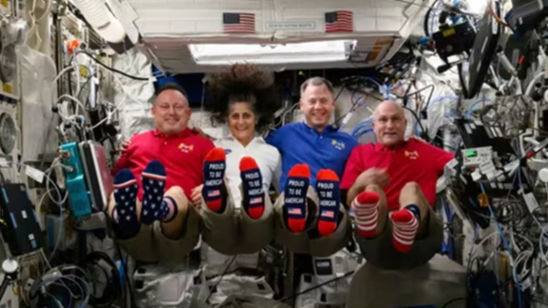A groundbreaking study has raised concerns about the cognitive effects of extended space missions. According to researchers, astronauts who spend long periods on the International Space Station (ISS) may experience slower cognitive functions, such as memory recall and processing speed. Published in Frontiers in Physiology, this research highlights a previously overlooked aspect of space travel, which has primarily focused on physical health challenges like radiation exposure, bone density loss, and sleep problems.
The Study’s Context and Recent Relevance
This research takes on particular importance in the current era of extended space missions. For instance, astronauts Sunita Williams and Barry “Butch” Wilmore, who initially embarked on an eight-day Starliner mission, had their expedition unexpectedly extended into months. Observers have raised concerns about their apparent weight loss based on recent images from the ISS. Additionally, SpaceX Crew-8 members Matthew Dominick, Michael Barratt, Jeanette Epps, and Alexander Grebenkin returned to Earth in October 2024 after 235 days in space. Unlike typical post-splashdown routines, the crew was immediately hospitalized upon landing in Florida. Though most were discharged the same day, one team member remained hospitalized overnight due to an undisclosed medical issue. Crew members have remained silent on the matter, citing “medical privacy.”
Evidence of Cognitive Changes
The study analyzed 25 astronauts to determine how long-term space missions affect cognitive abilities. Using tests to measure speed, memory, and attention, researchers found a noticeable decline in performance during and after space missions compared to baseline levels on Earth. The research noted that cognitive performance remained relatively stable over time but showed specific declines during certain mission phases. “There was slowed performance observed in early flight on tasks of processing speed, visual working memory, and sustained attention,” the study revealed. It also found reduced risk-taking behavior during the later stages of the mission and post-flight phases. Despite these findings, Dr. Sheena Dev from NASA’s Behavioral Health and Performance Laboratory emphasized, “There was no evidence of cognitive impairment or neurodegenerative decline in astronauts spending six months on the ISS.”
What Causes Cognitive Changes, and How Can They Be Addressed?
While the study did not pinpoint a definitive cause, stress is believed to play a significant role in these cognitive changes. Dr. Dev explained that stress impacts cognitive domains such as processing speed, attention, and memory on Earth and is likely exacerbated in space due to the challenging environment. “For example, if you happen to have a really busy day but couldn’t get much sleep the night before, you might feel like it’s hard to pay attention or that you need more time to complete tasks,” Dr. Dev explained. She further noted that the cognitive areas most affected aboard the ISS mirror those susceptible to stress on Earth. Interestingly, the study found that some cognitive changes persisted even after astronauts returned to Earth. However, these effects were temporary, and full recovery occurred upon their return.
Implications for Future Space Missions
As space agencies plan for longer missions to the Moon and Mars, understanding and mitigating cognitive effects will be crucial. The findings suggest that providing astronauts with tools to manage stress and ensuring shorter mission durations, when possible, could help maintain optimal cognitive performance. This research highlights the need to balance human endurance with the demands of interstellar exploration, ensuring the safety and well-being of astronauts venturing into the final frontier.







